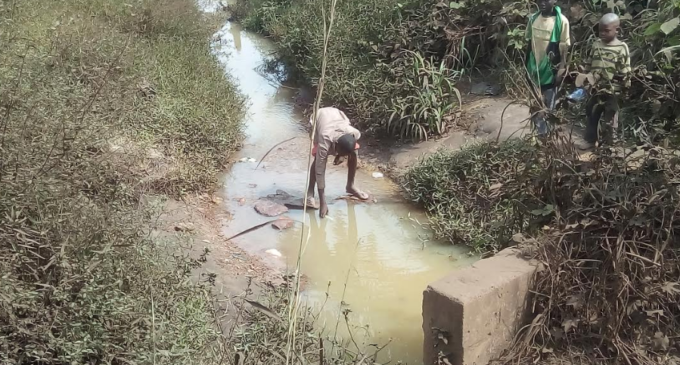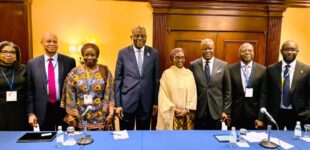Okobo, the Kogi village where coal mining is killing the people

In Okobo, life revolves around endless machine grunts, a never-settling haze of dust and a seemingly hopeless battle for crops, rights and sanity.
The young, old, senile, and children walk around with a defeated gait, like a people facing an immovable wall who still must try to survive.
“They are cheating us… they are cheating us,” a teenage boy says with agitated fervour, perhaps hoping it would help drive home his anger about the “injustice”.
Huddled in a bunch across the village square were elderly women who clasped their palms, and stretched them towards the sky in supplication — in sheer hope that the presence of the visitors could herald the beginning of the end of a long list of injustices they had suffered.
But, will it?
PAINS, DISEASES, SLEEPLESSNESS, DEATHS
“If I keep looking at my people like this, we will die in vain. We are now in danger over this matter,” said Angeyi Onegema, the community head.
In the sparsely-populated community, coal is more a curse than a blessing.
The five-year presence of Eta Zuma mining company in the community, located in Ankpa local government area of Kogi state, has brought with it deaths, diseases, pains and sleeplessness.
The town’s water supply has been contaminated by mining. Babies and little children are hardly able to sleep at night. Elderly women are left awake with series of internal and external pains, while coal dust periodically swirls around the town as trucks trudge in and out.
Presently, the only health facility is the ETA Zuma company-owned staff clinic, which community members lack access to. Consequently, those who fall ill are often transported to the poorly-equipped general hospital in Ankpa — a journey of more than two hours.
In five years, Okobo people have not seen the benefits of the company that makes its bread from their land.
CRUSHED TO DEATH
Everyone in Okobo appears to have a personal tale about the effects of mining activities. One by one, they had all been affected; not even the community head had been spared of the ripple effects of coal mining.
Every question elicited a chorus of responses, each listener struggling to paint their version of events of the last five years.
Onegema said the vibrations of heavy equipment used in the mine led to the collapse of the only primary school in the community. His son, Adamu, was one of the casualties of that incident.
As a result of the continuous excavating of coal with heavy equipment, it was only a matter of time before cracks began appearing on some structures in the village. The foundation of the school weakened gradually, and ultimately collapsed, killing Adamu.
The school was eventually rebuilt but Onegema’s son was gone for good.
“We are here living just like the colonial times. They didn’t build the school to compensate us. They built it because their machines destroyed the old one. Their heavy equipment killed my boy,” Onegema said.
“The company refused to build borehole. There’s nothing like hospital. The company even planned to set me up.
“Water from our stream can’t even be used for bathing. When they employ our boys, they turn them against us or threaten to sack them.”
For a few seconds, everyone remained still, as though digesting Onegema’s account.
NO QUIET, NO SLEEP, NO PEACE
To sleep seamlessly, many who reside in Okobo often go into neighbouring communities to find quiet and peace — away from the grinding noise of the coal-processing machines.
The Eta-Zuma coal mine is said to work round the clock, so it’s virtually impossible to catch a break or have a quiet nap.
Such free gifts of nature have become unaffordable luxuries to the Okobo people. The women bitterly complained that they were no longer able to farm on their lands, as they were gradually becoming fruitless.
“No water, land to farm, no job, no support from the company. We are very sad. It’s too much to bear,” said Salamatu Sule, the woman leader.
Their economic crops, which were almost due for harvesting around the time Eta-Zuma arrived Okobo, were taken from them because they fell within the confines of the mine location. The crops — cashew nut, Kolanut, etc — were later harvested and sold to the real owners by representatives of the mine company.
CHILDREN CAN’T SEE, READ OR SLEEP WELL
Adamu Muhammad Lawal, father of six-month-old Hauwa, contends with the daily struggle of getting his baby to sleep at night.
Lawal is worried that his baby, like other little children, would find it hard to see properly, owing to the effects of the dust. Even the children who manage to sleep, he said, often wake up abruptly at night.
“Immediately my wife put to bed, the pain was more than normal. All what this company is doing is affecting our sight seriously,” he said.
“Their activities are not good for our life. This dust affected my baby when he was born. It resulted in sickness for the baby. Later on, some of these children, when they start growing, they cannot read, sleep or see anything.”
Muhammed Abubakar, a youth, sharply interjected, saying: “Their work lasts 24 hours a day. If six trucks pass at once, it takes almost 30 minutes for the dust to settle. Whenever we write to the company, they won’t answer us.”
Abubakar attended the former primary school that collapsed and killed the son of the community head. At the new school built as replacement, he said there were only three class rooms.
Pupils in Primary 1 and 2 were merged; just as those in 3 and 4, and those in 5 and 6.
As is the case in many rural communities in northern Nigeria, only few of the people could converse effectively in English.
Even the trio of Abubakar, Lawal, and Hudu Arome, the resident translator, who could communicate effectively, did so with a great deal of difficulty.
YEARS OF TORTURE
Maryam Alidu, an elderly woman, suffers from occasional back and chest pains, while Taye Yakubu has a constant case of coughing, fatigue, and headache.
Rabiu Muhammad has similar conditions as those of Maryam and Yakubu, but she also has a niggling eye problem triggered by the dust generated by moving heavy-duty vehicles.
The discomfort of Juliana James varies from the other women’s; she often feels heat coming from within and always sweats profusely.
“We are very sad. It’s too much to bear,” James said while complaining that she had no money to go to the hospital.
Curiously, even the security officials at the outer entry of the mine had facial masks on, to protect themselves from dust inhalation. But the villagers didn’t.
DOOMED: SOIL, WATER, AIR
Over time, coal mining activities in Okobo have caused heavy metals to dissolve into the water bodies around the mine site, rendering the water acidic and highly toxic.
The condition of the water makes it unsafe for domestic use and consumption and the villagers – those who can afford it – are forced to survive on sachet water.
The metallic elements found in their water have dangerous effects on the human body, animals, micro-organism, and ultimately plant life.
An analysis by Global Rights found a high level of copper, cadmium, chromium, phosphates, manganese were found in soil samples within 10 metres of the mining pit in Okobo for both dry and wet season.
These elements could lead to kidney damage, liver damage, anemia, liver disease, muscle pain, eczema, gastro-intestinal disease, hypoglycaemia.
Simon Adogba, an environmentalist, conducted an air quality report during the visit facilitated by Global Rights, particularly monitoring the concentration of carbon monoxide, hydrogen sulphide and nitrogen dioxide.
“The monitoring points were in three places represented as MP1, MP2 and MP3 for the three gases. The compound of the chief is represented as MP1, the village stream is MP2 while the security gate of Eta Zuma Group is represented by MP3,” Adogba’s report stated.
“The concentration of carbon monoxide obtained for each of the monitoring point was between 187 and 208ppm, which is higher than the United States national ambient air quality standard of 35ppm for an hour’s exposure.
“According to the United States national ambient air quality standard, at concentration higher than 200ppm there is possibility of recurring headache, drowsiness, shortness of breath and nausea.”
Similarly, the concentration of hydrogen sulphide was between 0.9 to 1.2ppm, well above the 0.03ppm national ambient air quality standard for hydrogen sulphide.
For nitrogen dioxide, the concentration ranged between 3.8 to 2.5ppm while the standard concentration by the United States Environmental Protection Agency (USEPA) is 0.0533ppm.
According to the report, “exposure to concentration higher than 0.0533ppm could lead to acute or chronic lung problem”.
CONCENTRATION OF GASES MONITORED
| LOCATION (MP) | GASES MONITORED (PPM)CO NO2 H2S | ||
| MP1 | 187 | 2.5 | 0.9 |
| MP2 | 208 | 3.8 | 1.2 |
| MP3 | 205 | 2.5 | 1.1 |
YOUTH LEADER SHOT IN THE EYE
Idris Ibrahim, youth leader of Okobo, presently lies in the general hospital in Ankpa after escaping an attempt on his life by armed men.
Onegema said the youth leader was targeted for advocating justice and fairness to ensure his people benefit from their resource.
“Idris was waylaid and shot multiple times, losing an eye in the process. The company is now trying to rescue suspects of Idris’ attack,” he said.
“When they employ our boys, they turn them against us or threaten to sack them. There’s no levy being given to the community so we don’t have money to fight for our rights.”
At the palace of Onu Enjema (Adoga), traditional ruler of Enjema, who has spent about a year on the throne, there was a more vivid description of the attack on Idris.
“The person who was fighting for us has been shot down,” the king said.
“Some elements took it upon themselves to eliminate him but God Almighty intervened. He was shot, they used axe to cut him. We don’t have the money to even fight them.
“Some of my people have even abused me that billions of naira is leaving my community and I can’t do anything about it.”
Abubakar made it clear that he was not adverse to development, but only against oppression of his people.
“Any community that doesn’t want strangers cannot grow but you are not to come and oppress us.”
THE CONTENTIOUS CDA
 The minerals and mining act of 2007 mandates mining companies to reach a community development agreement with a prospective host community.
The minerals and mining act of 2007 mandates mining companies to reach a community development agreement with a prospective host community.
This CDA should have, in writing, the terms of agreement that will ensure that the community benefits socially and economically from the exploration of its resource.
In Okobo, the leaders said their CDA was signed by someone who is not a member of the community. This was after signing an initial CDA of 99 years with the company, which was later revised in 2014 and reduced to five years.
They refused to sign the revised CDA because of some terms they were against but somebody, a foreigner, signed on their behalf.
Reacting to the plight of Okobo, Gabriel Yakubu, an assistant director at the ministry of solid minerals, said the community should have lodged a complaint.
“There should be a functioning CDA in place,” he said. “The terms of the CDA should be measurable, time-bound and result-oriented.”
Yakubu decried the problem of manpower and lamented the unavailability of a mines environmental compliance officer in Kogi.
He promised the community that his department would take immediate action to address their situation.
In the process of filing this report, repeated attempts were made to contact the mining company to get their side of the story, but the efforts ended in futility.
Every call put across to the contact number on the company’s website failed to connect.
LOOMING DANGER
At the moment, Okobo is like a kettle of hot water that whistles upon reaching boiling point. After whistling for so long and left unattended to, the water dries up. Now, the kettle is all heated up and could potentially spark a fire outbreak.
Okobo is that whistling kettle that may ultimately explode.
Due to the disenfranchisement of the people, tensions between villagers and mine workers are high, while the open disgruntlement of the villagers could snowball into clash with the workers.
In several underdeveloped parts of Nigeria, neglected youths often resort to militancy in a bid to demand respect for their rights. Many a story of aggression and uprising in Nigerian communities started like Okobo’s.
Already, there’s a gradual migration of Okobo people to communities in its environs; many occasional nightcaps in another village to avoid the coal crusher’s noise have led to quite a few permanent relocations.
As Nigeria intensifies its effort to make coal a major source of power, what will become of the community and many others in the state if status quo is maintained? Diseases, deaths and extinction?





















Your comment..This is inhumane a treatment to be meted on a poor law abiding community. A blessing turned curse like the issue in Niger Delta. it’s rather apathetic.
I think what our people over there are facing is mercury poisoning, because coal mining is one among the major source of mercury release into the environment, relevant agencies should take note before we have cases of minimata in our beloved country
Pls the ENvironmental health Agencies should
Look into this matter seriously
Well we are suffering in our land. The youth leader who was blinded by the agents of Eta Zuma is my blood brother, I’m still planning hw we should d relevant authorities to come to our aid. My people, all our social infrastructures has been destroyed by the activities of the company
This is pathetic. Where is Dino Melanye? Where are our senators. Our reps should urgently take this up. The company is not above the law. thank you
pls how far apart is okobo village from aka village both in ankpa lga
I have googled the company after reading the post but couldnt get much on them. However, I dont want us to be guided only by the write up in the above article. Its good we think objectively.
How sure are we that some persons were not given money for social projects and they pocket it?
Main while, Okobo can’t tell me they don’t have those who are learned. They should write a letter tl the state government to intervene and other aurhorities.
Main while, I will send a mail to the company on this matter.
it is all lie. come to okobo and see what exactly is happening here.
the villagers are the one doing themselves.
they like money like kilode